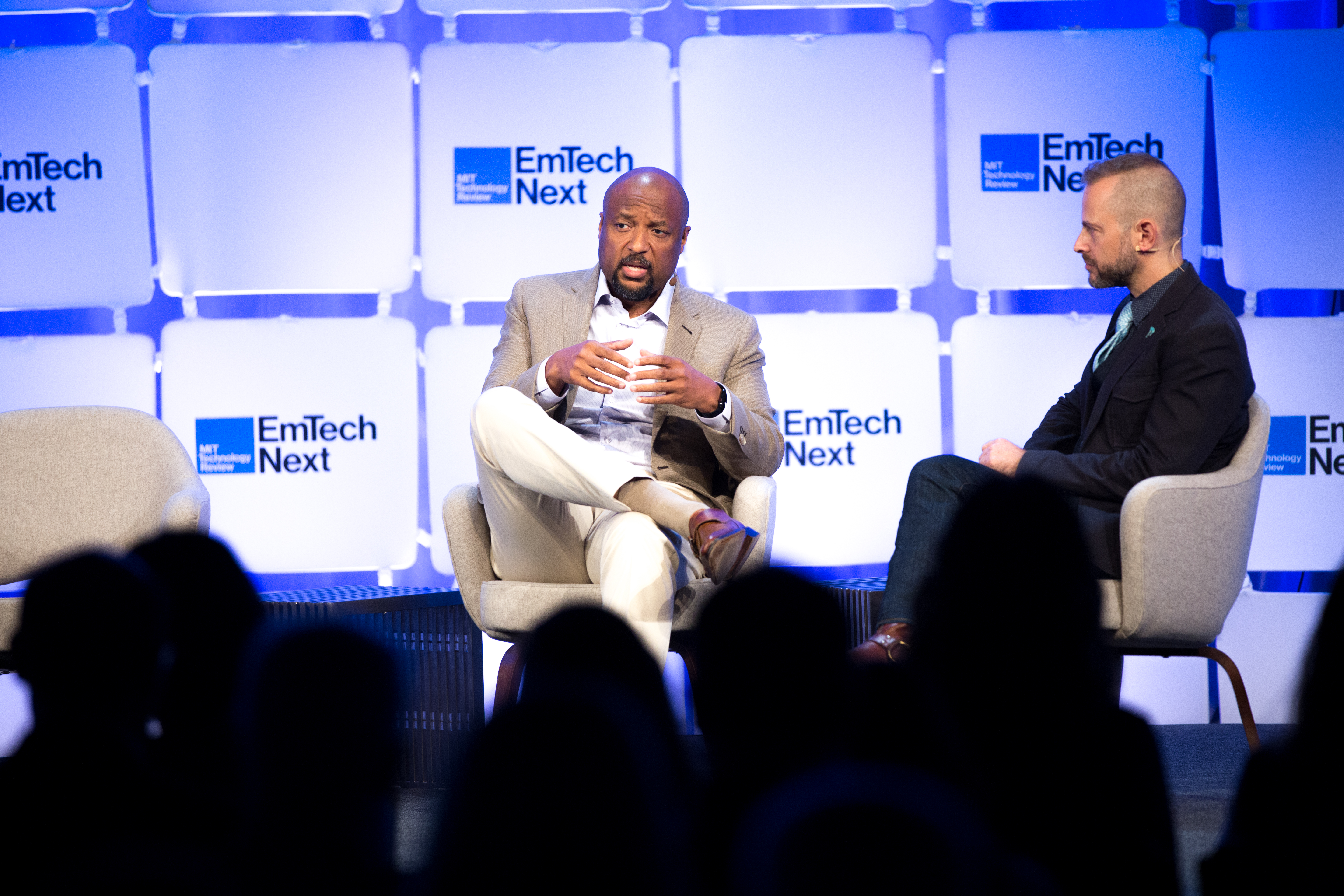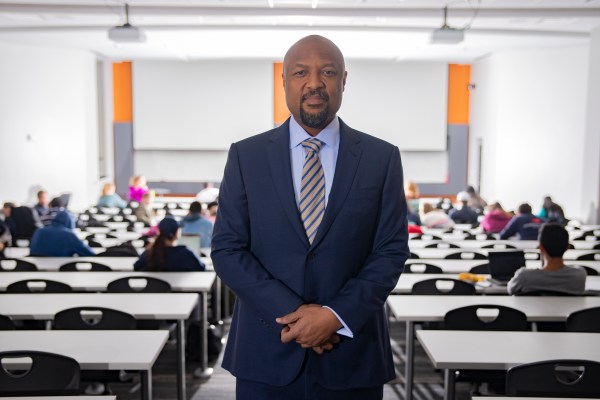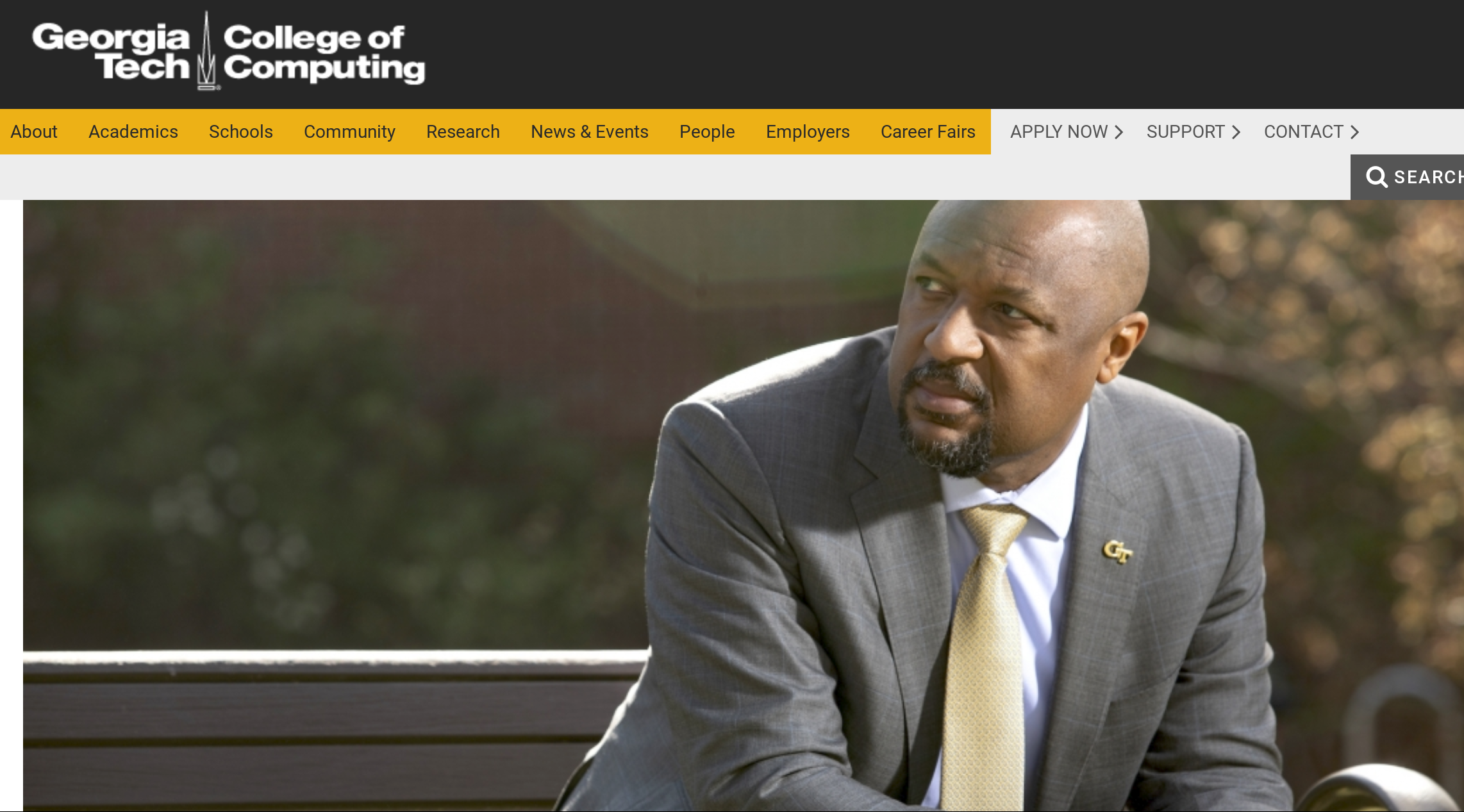The new fall semester is upon us, and at elite private colleges and universities, it’s hard to find a trendier major than Computer Science. It’s also becoming more common for such institutions to prioritize integrating ethics into their CS studies, so students don’t just learn about how to build software, but whether or not they should build it in the first place. Of course, this begs questions about how much the ethics lessons such prestigious schools are teaching are actually making a positive impression on students.
But at a time when demand for qualified computer scientists is skyrocketing around the world and far exceeds supply, another kind of question might be even more important: Can computer science be transformed from a field largely led by elites into a profession that empowers vastly more working people, and one that trains them in a way that promotes ethics and an awareness of their impact on the world around them?
Enter Charles Isbell of Georgia Tech, a humble and unassuming star of inclusive and ethical computer science. Isbell, a longtime CS professor at Georgia Tech, enters this fall as the new Dean and John P. Imlay Chair of Georgia Tech’s rapidly expanding College of Computing.
Isbell’s role is especially given Georgia Tech’s approximately 9,000 online graduate students in Computer Science. This astronomical number of students in the CS field is the result of a philosophical decision made at the university to create an online CS master’s degree treated as completely equal to on-campus training.
Another counterintuitive philosophical decision made at Georgia Tech — for which Isbell proudly evangelized while speaking at conferences like the MIT Technology Review’s EmTech Next, where I met him in June — is to admit every student who has the potential to earn a degree, rather than making any attempt at “exclusivity” by rejecting worthy candidates. In the coming years all of this may lead, Isbell projected at EmTech Next, to a situation in which up to one in eight of all people in the US who hold a graduate degree in CS will have earned it at Georgia Tech.

Isbell speaks to Gideon Lichfield, Editor-in-chief of the MIT Technology Review, at its EmTech Next conference in June. Image via MIT Technology Review.
“What they’ve done is pretty remarkable,” said Casey Fiesler, a 3x recent graduate of Georgia Tech and a founding faculty member and CS professor at the University of Colorado’s College of Media, Communication, and Information.
And it’s promising that Fiesler, who has become known in the tech ethics field for her comparative study of curricula and teaching approaches, told me, “ethics can be integrated into online [CS] courses just as easily as it can be into face to face courses.”
Still, it is as daunting as it is impressive to think about how one public school like Georgia Tech might be able to successfully and ethically educate such an enormous percentage of the students in arguably the most influential academic field in the world today. So I was glad to be able to speak to Isbell, an expert on statistical machine learning and artificial intelligence, for this TechCrunch series on the ethics of technology.
Our conversation below covers the difference between equality and equity; cultural issues around women in American CS, and what it would look like for ethics to be so integrated into the discussion of computing that students and practitioners wouldn’t even think of it as ethics.
Greg Epstein: Around 1/8 of Computer Science graduate degrees will be delivered by your school in the coming years; you’re thinking inclusively about providing a relatively huge number of opportunities for people who would not otherwise get the opportunity to become computer scientists. How have you achieved that?
Charles Isbell: There’s an old joke about organizations: don’t tell me what your values are, show me your budget and then I’ll tell you what your values are. Because you spend money on the things that you care about.
That’s true for universities. But what else is true for universities is, don’t show me your budget, show me your degree programs. That’s where you operationalize what you believe.
No matter what research you’re doing or what you’re thinking through, if you don’t turn it into a degree, you aren’t making it real. So when you ask about inclusiveness, about transforming education, the key is education is a mechanism by which you express your values.
The only way to deal with the problems we [in computer science] have — massive demand and not enough supply — is by fundamentally being inclusive. What we normally think of as the minimum barriers to integrate: you have to have a degree from this place, you have to have done all these things… There aren’t enough people in that situation.
So there’s a joke my Dean likes to tell: how do you tell the difference between a good university and a bad university? [At] a good university, the output isn’t much worse than the input.
Good universities do minimal damage to their students. You get the best people in, and let them do whatever they do for four or five years. Then they come out, and guess what? They’re still great students, right?
That means the way you get prestige in Higher Ed is, reject as many people as possible. You don’t actually have to worry too much about getting [students] from here to there, because mostly they’re already prepared before they ever met you. You can pick the cream of the crop, [so] you get success.
We have to move to a world where your prestige comes from how much better you make the output. That means, accept every person you believe can succeed, then help them to succeed. And that’s the difference between equality and equity.
Equality is: treat everyone the same, [not knowing whether] good things will obtain. Equity is about taking people who can get from here to there and putting them in a situation [to] actually succeed. And without equity, you’re never going to generate the number of people we need in order to be successful, even purely from a selfish, change the economy, make the workforce stronger, [point of view.]
There aren’t enough people who’ve had the background, but there are more than enough people who are capable, given opportunity and proper support.
Georgia Tech is a large R1 university. We have a particular mission, around research and giving people an opportunity to do that.
Community colleges in Georgia have a different mission, of access and of helping people who have not had Algebra, for example, to still get in and succeed. If we tried to take on their mission entirely, we would fail. But we can’t use that as an excuse to walk away from the notion of access.
Epstein: Sometimes what we think of as a good school is a school that takes people who are already going to win, makes them more likely to win, and teaches them that by winning they are actually making the world a better place. Which then makes them impervious to new information about why they might not want to win so often.
Isbell: Absolutely right. I mean, that’s not just universities. Universities are reflecting the way societies work. If you’re winning, it’s in your best interest to [think,] “Oh, I won because of something special I did, I deserve what I have.” And so on.
I try to remind myself: never think in terms of whether you deserve what you have. Because think about how terrible the universe would be everything that happened to you, you deserved. You don’t want to live in that world.
You don’t even want to ask the question, who deserves this and who doesn’t deserve that? Other than, everyone deserves an opportunity. And you want to give people the chance to self actualize. That’s the thing that I think really matters.
Epstein: Tell me a little bit more about your approximately 9,000 master’s students that are taking online courses.
Isbell: At this point, they’re [on average] in their low thirties, mostly working full time. They’re all over the country.
If you look at our on-campus degree, going back three or four years, about 85% of the applicants were foreign nationals. The vast majority of them were coming from India, followed by China, and then a smattering of other mostly non-European countries. We’re accepting somewhere between 10-15% of those students. Only 15% are US citizens or permanent residents.
Compare that to our online degree where about 85% were US citizens or permanent residents. After six years that number has held up at about 70%.
These students have a mortgage, they have kids, and this is an opportunity to change careers, develop new skills. Working full time, there is no universe in which they were going to be able to pursue an advanced degree, because it would involve giving up their job and moving halfway across the country for two years and coming up with $46,000 or whatever it costs. As a result, the number of underrepresented minorities in our online program is significantly higher.
Interestingly, the percentage of women is lower online, but it turns out that that’s a consequence of something else. Which is, if instead of comparing women to women as a percentage online and on campus, you instead compare American women and non-American women [online] to American women and non-American women [on campus].
It turns out the dearth of women in Computer Science, particularly advanced graduate Computer Science, is an American problem. So if you tell me you’re a woman in a masters program in Computer Science at Georgia tech on campus, then I would do well to bet that you are not from the United States.
Epstein: So that suggests a culture problem in the United States around Computer Science and women.
Isbell: It suggests that. Yeah.
Epstein: Do you have anecdotal evidence to support that?
Isbell: We’ve got the numbers, that’s it.
Epstein: Understood that in-depth studies may not have been possible at this point, but in dealing with as many computer science students as you are, you’re as much of an expert on this topic as anyone. Is there anything else, in your subjective experience of patterns at Georgia Tech, that might add to a sense of bias against women in American computer science culture?
Isbell: Well, women get turned off from CS at an undergraduate level pretty quickly. You see, when they go to companies, even with CS degrees, they tend to disappear from the field, by the time they get to the management level. It’s unclear why.
One of the reasons it’s hard to know is because it’s only recently that large companies like your Apples and your Microsofts and your Googles have started giving us some insight into what their actual demographics are. So this is all relatively new for us, but you can see that well over 40% of all of the computer scientists in the 1970s and early 1980s were women. That number’s dropped below 20.
Epstein: Again suggests to me a culture issue.
Isbell: Something happened. Probably the PC culture. By PC I mean personal computer. The personal computer culture and thinking of computer scientists as people who were hobbyists who like to build computers alone in their rooms. That kind of happened in the 80s.
I think that some people believe that that was a big chunk of it because it turned it into a different, ‘people who like to build cars,’ set of people. Although we’ve moved beyond that now. People aren’t sitting at home building computers the way they did when I was a kid.
Epstein: What I’m hearing is, starting in the 80s a certain group of people created a culture around themselves and then that culture became enormously influential. And I mean, people tending to sit around by themselves, isolated, building things without being socially connected with one another… that sounds to me like a problem I’d primarily associate with white male Americans.
Isbell: Yeah. In fact, you can see that in all kinds of ways things are happening in Silicon Valley for example, who goes and who stays. There are people who actually study this for a living, who could tell you more. But it certainly looks that way anecdotally for me. And clearly there’s a problem with that, no matter what.
But as computing expands out and touches every part of society, both for good and for ill, you have to bring more and more people into it. And the kinds of jobs and skills you want them to have are going to require a very different kind of cultural view of the world.
Epstein: Since you’re going to be responsible for educating such a big percentage of Computer Science students, what do you think Computer Science degrees need to include about ethics?
Isbell: I love this question, because even the way it’s phrased tells you the problem. It treats ethics as a thing that is separate from Computer Science. And it’s difficult not to think that way, because ethics is missing, clearly.
If you’re a civil engineer, you have to be certified to build that bridge. If you aren’t certified, you can’t build a bridge. That’s considered a profession.
Computer Science is not considered a profession. There isn’t a code of [computer science] ethics the way a profession has a code of ethics, even though various groups try to create codes of ethics that say ‘you are responsible for this.’ When the bridge falls down, you’re responsible. when the plane crashes because you have a software bug you’re responsible, when the robot shoots the wrong person, none of that is built into our notion [of CS ethics].
So the reason I liked the question is, it tells you is ethics should not be taught along with Computer Science, ethics must be fundamentally integrated from the very beginning. And that’s hard.
First off, it’s hard to get people like me to do it because I don’t teach ethics. However, I do have life experience and I do know the impact of the work that I’m doing.
And if you can get someone, from the very first line of code they write, to recognize that they’re building something that can have an impact on people, it’s changing everything around them, and to start thinking about that as the consequences of what they’re doing as opposed to the “ethics” of what they’re doing, then the part where you say, ‘this is an ethical question,’ becomes easy. But if you treat [ethics] as a thing that happens at the end, sort of this magic box, it allows you to avoid it and say, “Okay, I’m going to graduate with a 4.0 and get a job. It doesn’t matter.”
But when you build a database that allows you to track people and, say, their sexuality, that has political consequences. You may choose to do it; you may choose not to do it.
I’m not taking a position on what’s right or what’s wrong, but you should recognize: there are consequences to that. That has to be built in from the beginning. Ethics has to become so integrated into the discussion, you don’t even think about it as ethics.
Epstein: I hope you and your colleagues do a great job with that. Because I’m concerned a lot of the teaching of ethics that I’ve started to observe in some big-name programs is just kind of ‘mailing it in,’ as one observer I really respect described it to me recently.
Isbell: It’s a hard problem. My own work is around modeling human behavior, including how machines interact with humans. I’ve also explored how one can persuade people into doing things using machine learning while convincing them it is their own idea.
We have been teaching, forever, an ethics course that’s a requirement for part of our Bachelor’s of Science in Computer Science. Every student has to take it. I actually did the very first class I ever taught when I came back to Georgia tech.
It has since expanded; the class is “Computing and Society,” which I think is [a better title] than “Ethics for Computational.” We now have Robots and Society; we have Privacy and Society; we have Data and Society. We’re bringing all of these [topics] together to help people to think, whatever it is you think you’re interested in doing with [technology,] it’s going to impact society.
We’ve been doing this for a very long time; people get interested in it. What we have to figure out how to do is bring that [focus on technology and society] all the way to the very beginning so that people, particularly people who aren’t going to get a degree but are still going to be doing all this data science type stuff, get exposed to that very early on.
[So that] they don’t think of it as a thing they have to learn about, just a question you ask whenever you build anything. We haven’t gotten there. The field didn’t start out that way and so it’s very hard to change it, because what you’re talking about is cultural change, and as you know, culture eats strategy for lunch.
Epstein: What it’s been like for you to start this new academic year as a dean? How has your new leadership role impacted your view of the ways your field needs to evolve?
Isbell: It has been a wonderful experience becoming the new Dean of Computing. Perhaps the most important part of the last few months has been the chance to really engage in the larger computing community, not just our alumni and supporters, but those who have not had the opportunities to engage fully in the digital ecosystem.
It has reinforced my belief that institutions like Georgia Tech—public or otherwise—must figure out ways to engage everyone at all stages in their lives. Despite my further turn to administration I will continue to teach in the OMS programs for that reason, just as I will continue to give my time toward broadening participation in computing.
Epstein: And finally, as I conclude all of my TechCrunch interviews: how optimistic are you about our shared human future?
Isbell: I’m as optimistic about it as I was 15 or 20 years ago. I actually think, at least from the point of view of technology, that we’re headed in a relatively good place.
Here’s what I think our fundamental problem is, when you talk about our shared human or shared human future: our problems are exponential. They grow, like that (makes gesture indicating an exponential growth curve).
Almost all of our solutions, whether they’re political or they’re raising enough teachers to teach people or whatever, they’re linear. Linear grows, well, like a line. Exponential grows…exponentially. And at some point the exponential problem is so far ahead of the linear solution, you have no hope in solving it, ever.
The only way to fix that is, stop thinking linearly and do some kind of major disruption. I think we’re still capable of that disruption. Whether you’re talking about climate, education, equity, our politics. We can still have that disruption.
I’m very optimistic we will have that disruption and the right thing will happen. But it is by no means, by no means a guarantee.
Epstein: Thank you very much! I’ll be following your work and wishing you success.



